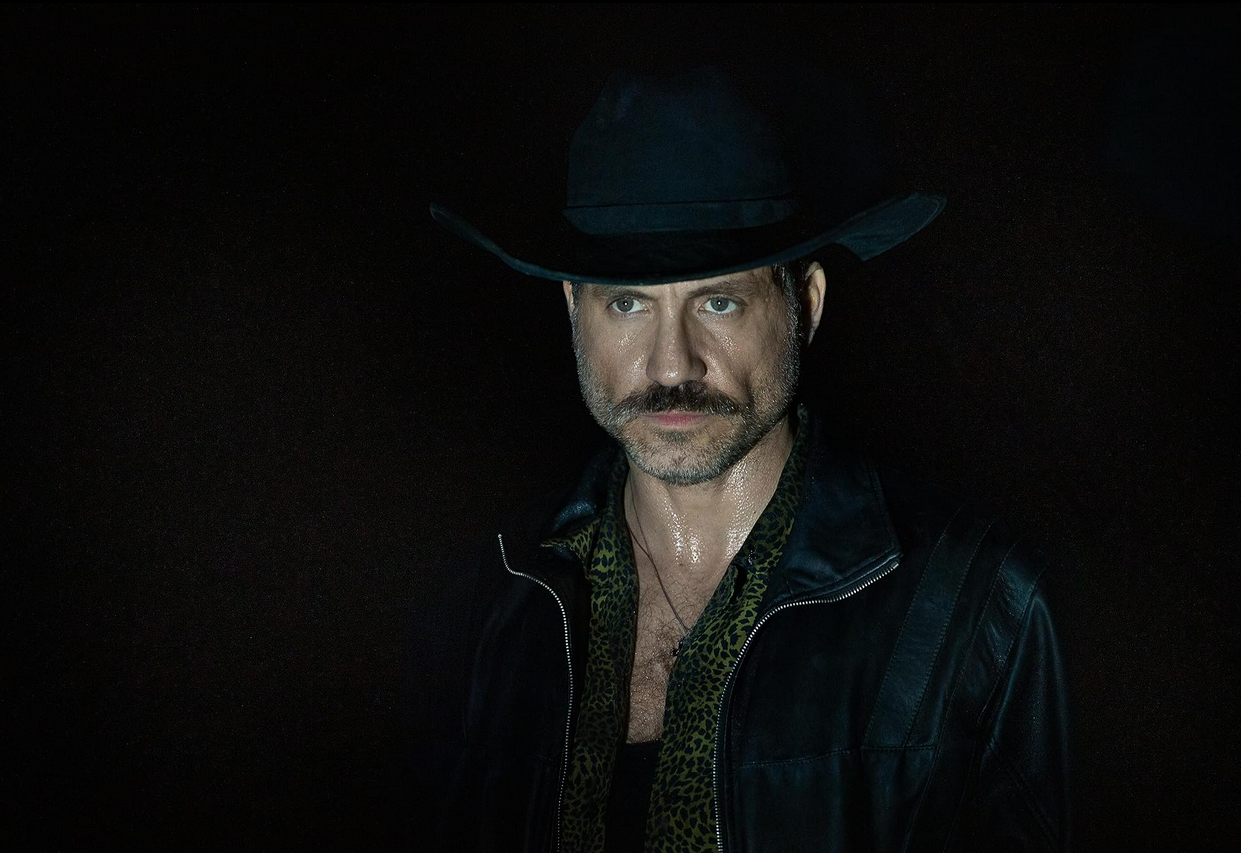Zoë Saldaña as Rita Mora
Emilia Pérez has been hugely successful at the festivals this year, winning a clutch of awards for Director, crew & cast as well, and is now appearing on the longlist of no fewer than 15 different categories at BAFTA. It just won Best Non-English language picture, musical and comedy Golden Globe, while Zoë Saldaña was awarded Best Supporting actress and EL MAL, was best song. Impressive accolades. Karla Sofía Gascón accepted the Best Picture award saying: -
The Light always wins over darkness
At the Cannes 2024 Festival this year, Emilia Pérez also won ‘Best Film’ as well as ‘Best Actress’ for all four of the protagonists, who shared the prize. The film comes across as a fresh take on the thriller genre and people are reacting favourably to it.
Fate will find you on the road you took to avoid it.

Stuck in a dead-end job, floundering on a low salary and obliged to whitewash criminals and get them off on technicalities, despite knowing they are guilty, Zoë Saldaña plays Rita Mora Castro, a talented lawyer to perfection. Zoë Saldaña (Avatar: The Way of Water, The Avengers- seen above) as Rita, is ripe for persuasion to help in an unusual and highly dangerous task. Tempted by the promised ample remuneration that will be relayed to an account in her name on the Cayman Islands, Rita agrees to help on the project, unaware that it is not only Manitas’ life that will be totally transformed. Rita’s life will also, in effect, be turned upside down, from fearing for her life, to becoming the confidant of drug warlord Manitas, who then transforms into the sensual and seductive Emilia Pérez.
“Help me transition, relocate my family and organize my disappearance and I will pay you so much that you can retire in style.”
… pity it does not quite work out that way, as Rita ends up working harder than ever, save for a brief interlude! Not only has Manitas decided to live as her true self and undergo whatever surgery might be necessary for this, but, when she falls in love with Epifanía (played by Adriana Paz) she becomes haunted by her violent past and, full or remorse, decides she must make amends. She then re-enlists the talents of Rita Mora Castro and they create a charity to help people find the bodies of their disappeared relatives.
Jacques Audiard was fascinated by the idea of a “hyper macho, violent character who has a desire for femininity.” Originally planned as an opera, his first jottings read as a libretto. His initial work with the composer Clément Ducol began as early as 2020. Taking into account the variety of work Audiard has produced, from the violent prison drama The Prophet (2009) the unusual The Beat my heart Skipped (2005) to the dramatic Rust and Bone (2012¸ branching out into a musical, is a huge leap.
Set in Mexico City (although it was shot in Paris), with Emilia Pérez, Audiard challenges the idea of a straight-forward musical with inventive bravery. The characters burst into song and dance at key moments. In this way, playing with genres, Audiard turns what could have been a traditional, violent drug cartel film into a far more nuanced, emotional and layered production. The music and dance numbers, using a variety of musical genres, become an essential element in the narrative of the film. In some ways reminiscent of Ema (2019) by Chilean Pablo Larraín, who used dance and music to express the emotional side of the story.

The opening musical sequence El Alegato (The Plea) by Lin- Manuel Miranda (Hamilton, Moana) is performed true to his flowery and melodramatic style. A highly complex number, it took three weeks to film, with the sophistication of blue screens and featuring at least 200 extras. Having Rita walk down the dark and dangerous streets of Mexico City late at night, surrounded by the groups of tap dancing destitute people, immediately set the tone and mood of the production.

Miranda’s presence in this production is palpable, even if he did not create the later musical numbers. These were composed by Clément Ducol and the talented French singer-songwriter Camille, who jointly created 16 original songs for the film. One of my favourites for being extremely witty, is La Vaginoplastica, performed by Zoë Saldaña and Chris Jon. They sing enthusiastically about rhinoplasty, penoplasty and vaginoplasty! Were it not a film that is clearly sympathetic to gender reassignment there could be an element of irony involved, and all because Manitas has told Rita, she must find the best doctor in the world: -
Rita Hello, very nice to meet you, I’d like to know about sex change operations?
Doctor Man to woman or woman to man?
Rita Man to woman.
Doctor From penis to vagina
Despite being criticized as simplistic, this is no problem for the new “Emilia” who happily describes herself as “Half he, half she”.

Karla Sofía Gascón with Adriana Paz
Rita is the centre around which the story revolves, even the dancing and choreography. She acts as a narrator, even the conscience, the instigator to the Greek chorus of violence and family that surround her. The maypole around which everyone dances. Emilia started the ball rolling, first pre-op then post- op, later posing as a distant cousin, while Gómez, the displaced wife struggles to live a life that is not controlled by those around her.
Paul Guillhaume’s cinematography is immaculate as he deals with the ever more complex scenes with extras and different locations with lighting challenges. In effect, the result is that the lighting effects, in particular, stands out. He works carefully with moods and the first section of the movie uses muted tones creating a sombre start, which then progress to a bright and brilliant centre. Then gradually, it dims again to the darker ending.

Selena Gómez as Jessi
Another number to note was Mi Camino. Performed by the immensely charismatic and multi-talented Selena Gómez who plays Manitas’ wife Jessi Del Monte. It becomes a powerful statement in the movie. Inspired by her own struggles with depression and Lupus, Gómez was determined to explore her own vulnerability and her fight for survival and the energy that results, is in full evidence.
A lot of time and thought was spent on the music. Composer Ducol is adamant that it was not complementary to the script, but ‘is’ the script. I am not sure I agree, as what remained with me were the individual journeys of all the characters, albeit beautifully enhanced by the music.

The multi award winner Zoë Saldaña (46) trained as a classical dancer, and being of Dominican and Puerto Rican ancestry is bilingual. Selena Gómez is also a hugely talented creative and activist on mental issues. An actress, singer songwriter, producer and businesswoman, she started out as a child actor and considers herself an American–Mexican although her mother was of Italian descent. She has gained recognition voicing Mavis Dracula in the Transylvania Hotel franchise, as well as having a pop/rock band with numbers having success on the albums and singles charts in the US and the UK. The youngest of the four leads, at only 32, she already has a substantial body of work already behind her.
Manitas & Emilia are both played by the transgender actress Karla Sofía Gascón (52). Born in Spain, she eventually moved permanently to live in Mexico, a country with which she now identifies. She appeared in films and telenovelas in Spain, such as “El Señor de los Cielos (2013) and The Noble Family (2013).

Adriana Paz (44) who plays Epifania, was born in Mexico. She started out initially, as a dancer in Spain. She has received many awards and nominations including a Goya and an Ariel for her work in TV and films. She also appeared in Spectre (2015). She is a vital ingredient of the story, not only as the love interest of Emilia, but also the person who opened Emilia’s eyes to the horrors, she herself, as Manitas, had inflicted on so many families. Now struggling to keep her own children within reach, the real meaning of the violence and how it affected people and communities, hits Emilia at last. But are people actually able to change who they are, or does the past come back to haunt them?
This was a film where all the leads held their own, each one with a powerful screen presence of their own, not surprising that at Cannes 2024, they shared the ‘Best Actress Award’.

There are few lead men in Emilia. Gascón plays Manitas herself to full effect, having had to persuade Audiard that there was no need for another actor for the part. The other man, Gustavo Brun (Édgar Ramírez) the lover of Jessi, the ‘widowed’ wife, comes across as a brute. Are there any men in Mexico that are gentle? It is understandable that Manitas, to be different has to undergo a sex change! However, that is not the only reason, there is also the wish to depart from the violence of the cartel life with some degree of safety in anonymity. Can she succeed?
Audiard’s Emilia Pérez shines with his fresh approach, creating a powerful impact that has been wowing audiences.
Available on Netflix in the US, UK and Canada.
EMILIA PÉREZ (2024)
Director Jacques Audiard / Book: Boris Razón/ Screenwriters: Jacques Audiard, Thomas Bidegain. Nicolás Livecchi & Léa Mysius / Production: Jacques Audiard, Pascal Caucheteux, Valérie Schermann / CinematographerL Paul Guillhaume/ Music: Camille and Clément Ducol / Editing: Juliette Welfling.
Cast : Epifania : Adriana Paz / Manitas/Emilia: Karla Sofía Gascón / Rita Mora: Zoë Saldaña / Jessi Del Monte: Selena Gómez/ Gustavo: Édgar Ramírez.















